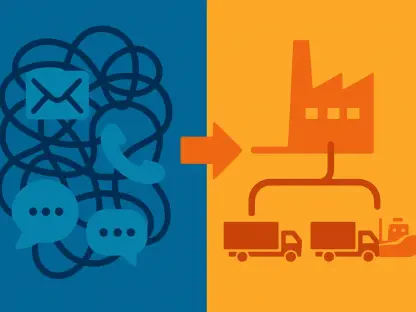Artificial intelligence (AI) is fundamentally changing the landscape of the auto insurance industry, driving a shift from cumbersome, traditional methods to streamlined, data-powered systems that promise unmatched efficiency and personalization. This transformation impacts every aspect of the sector, from how risk is assessed to the speed at which claims are processed, reshaping the relationship between insurers and policyholders. Far from being a passing trend, AI represents a deep-rooted evolution, offering the potential for quicker resolutions and pricing that reflects individual behavior. However, this progress comes with its share of complexities, including concerns over data privacy and the ethical implications of automation. As technology continues to advance, its integration into auto insurance raises both exciting possibilities and critical questions about the future, setting the stage for a comprehensive exploration of its impact.
Unleashing Efficiency Through AI Innovation
Transforming Routine Operations
AI is proving to be a catalyst for operational efficiency, redefining how auto insurers manage day-to-day tasks that once slowed down the system with paperwork and delays. By automating processes such as underwriting and initial claims assessments, AI tools eliminate the inefficiencies of manual workflows, enabling faster turnaround times. A standout example is image recognition technology, which allows insurers to evaluate vehicle damage through photos uploaded via smartphones, generating repair estimates almost instantly. This not only speeds up service delivery but also reduces the risk of human error, benefiting both the insurer’s bottom line and the customer’s experience. The move to digital processes reflects a broader industry trend toward speed and precision, ensuring that resources are allocated more effectively.
Reducing Costs and Enhancing Scalability
Beyond speeding up individual tasks, AI’s ability to handle large-scale operations offers insurers a pathway to significant cost reductions and improved scalability. Advanced algorithms can process thousands of data points simultaneously, streamlining decision-making across vast portfolios of policies without the need for proportional increases in staff. This efficiency translates into lower operational expenses, which can potentially trickle down to policyholders in the form of more competitive premiums. Additionally, AI systems adapt to growing data volumes, ensuring that insurers can scale their services to meet demand without sacrificing quality. This adaptability is crucial in an industry facing ever-increasing complexity, positioning AI as a cornerstone for sustainable growth and responsiveness to market shifts.
Redefining Risk and Pricing Models
Personalizing Premiums Through Data Insights
AI is revolutionizing the way auto insurance premiums are determined, moving away from outdated, blanket approaches based on demographics to highly personalized models rooted in real-time data. By leveraging telematics and mobile applications, insurers can now monitor specific driving behaviors—such as speed, braking patterns, and mileage—allowing for a more accurate reflection of individual risk. Usage-based insurance (UBI) programs are at the forefront of this change, rewarding cautious drivers with lower rates for demonstrating safe habits on the road. This shift not only promotes fairness by aligning costs with actual behavior but also empowers drivers to take control of their expenses through mindful driving practices, marking a significant departure from traditional pricing structures.
Improving Risk Prediction Accuracy
The precision of AI in risk assessment extends beyond pricing to fundamentally enhance how insurers predict and manage potential losses. By analyzing detailed data sets that include driving history, environmental factors, and vehicle conditions, AI creates comprehensive risk profiles that far surpass the capabilities of conventional methods. This detailed approach enables insurers to anticipate claims more accurately, reducing unexpected financial burdens and refining their overall risk management strategies. For policyholders, this means evaluations that are based on tangible actions rather than broad assumptions, fostering a sense of equity. The depth of insight provided by AI ensures that the industry can better prepare for diverse scenarios, ultimately stabilizing pricing and coverage offerings for all stakeholders involved.
Accelerating Claims and Combating Fraud
Expediting Claims Resolution
One of the most tangible benefits of AI in auto insurance lies in its ability to streamline the claims process, addressing a longstanding frustration for many policyholders. Through automation and machine learning, AI systems drastically reduce the time and paperwork involved in filing and resolving claims, often delivering decisions in a fraction of the time once required. Simple cases can be handled almost entirely by algorithms, while more complex claims are flagged for human review, ensuring efficiency without sacrificing thoroughness. This rapid processing enhances customer satisfaction by minimizing wait times and providing clarity during stressful situations, fundamentally improving the interaction between insurers and their clients.
Strengthening Defenses Against Fraudulent Claims
AI also serves as a powerful tool in the fight against insurance fraud, a persistent issue that inflates costs for honest policyholders and strains industry resources. By sifting through vast amounts of claims data, AI identifies patterns and anomalies that may indicate fraudulent activity, such as inconsistent details or suspicious timing. These insights allow insurers to intervene before payouts are made, saving significant sums and maintaining the integrity of the system. For customers, this translates into greater trust in the fairness of the process, knowing that resources are protected from misuse. The proactive nature of AI-driven fraud detection marks a critical advancement, reinforcing the industry’s commitment to transparency and accountability.
Confronting the Ethical and Practical Hurdles
Weighing Advantages Against Potential Risks
While the advantages of AI in auto insurance—such as faster service, precise pricing, and enhanced fraud detection—are clear, the technology also introduces a range of challenges that cannot be overlooked. Privacy concerns are paramount, as the extensive data collection required for personalized assessments can leave drivers uneasy about constant monitoring of their behaviors. Additionally, there’s the risk of algorithmic bias if AI systems inadvertently perpetuate unfair patterns due to flawed design or training data. The reduction in manual roles also raises questions about job displacement within the sector. These issues highlight the importance of approaching AI adoption with caution, ensuring that the benefits do not come at the expense of trust or equity among stakeholders.
Establishing Guidelines for Responsible Use
Addressing the ethical and regulatory dimensions of AI integration is essential for its sustainable growth in the auto insurance industry. Protecting sensitive customer data must be a priority, alongside efforts to design algorithms that avoid bias and promote fairness in decision-making. Clear communication about how AI influences outcomes like pricing or claims approvals is equally critical to maintain transparency with policyholders. Regulatory frameworks are expected to evolve in the coming years, setting standards that balance innovation with consumer protection. These guidelines will likely shape the pace and scope of AI’s implementation, ensuring that the technology serves as a force for positive change rather than unintended harm, and fostering an environment of accountability.
Envisioning the Future of Auto Insurance
Embracing Fully Digital Experiences
The trajectory of AI in auto insurance points toward a future where customer interactions are entirely digital, reshaping the way policies are managed from start to finish. Imagine obtaining a quote, filing a claim, or adjusting coverage through intuitive mobile apps, with AI powering every step for speed and convenience. Such seamless experiences are already in development, driven by algorithms that anticipate user needs and deliver tailored solutions instantly. This shift promises to redefine customer expectations, prioritizing accessibility and efficiency. As digital platforms become the norm, insurers will need to invest in robust cybersecurity measures to protect against data breaches, ensuring that convenience does not compromise safety in this increasingly connected landscape.
Adapting to Emerging Trends and Technologies
Looking further ahead, AI is poised to navigate groundbreaking trends like the rise of self-driving cars, which will challenge existing notions of liability and coverage in auto insurance. Questions about whether responsibility lies with the driver, manufacturer, or software developer in the event of an accident are becoming more pressing. Additionally, real-time data from vehicle sensors could usher in dynamic pricing models, adjusting premiums based on immediate driving conditions or behaviors. These innovations signal a profound evolution, requiring insurers to rethink traditional frameworks. Regulatory oversight will play a crucial role in addressing these complexities, ensuring that as technology advances, the industry remains adaptable and equitable, ready to meet the demands of a rapidly changing world.
Reflecting on AI’s Transformative Journey
Looking back, the integration of AI into the auto insurance industry marked a pivotal moment, as it dismantled outdated systems and introduced a wave of efficiency and personalization that redefined service standards. Automation of routine tasks, precision in risk assessment, and the fight against fraud were among the standout achievements, alongside pricing models that rewarded individual behavior. Yet, the path was not without obstacles—privacy debates, ethical concerns, and the need for transparency persisted as critical issues that demanded attention. For the industry, the next steps involve a steadfast commitment to refining AI tools, ensuring they align with fairness and trust. Insurers must prioritize robust data protection and clear communication with customers, while policymakers should craft regulations that encourage innovation without sidelining consumer rights. As technology continues to evolve, staying proactive in addressing these challenges will be key to sustaining the momentum of this remarkable transformation.









